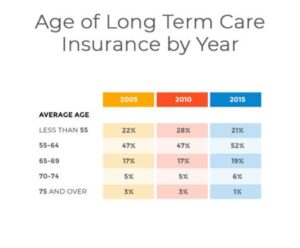federal long term care, Explore federal long-term care insurance options, qualifications, costs, and how to maximize benefits for effective planning and coverage.Navigating the complex landscape of healthcare options can be daunting, especially when considering the future needs of you and your loved ones. The Federal Long Term Care Insurance Program (FLTCIP) offers vital support for federal employees, retirees, and their families, ensuring that they are prepared for potential long-term care needs. With increasing life expectancies, planning for long-term care is crucial. This article will guide you through the essential aspects of federal long-term care insurance, from understanding your options and eligibility criteria to comprehending the costs and coverage available. We will also discuss how to maximize the benefits under this program, empowering you to make informed decisions about your future. Whether you’re just starting to consider long-term care or looking to optimize your current plan, this comprehensive guide serves as your roadmap to securing your long-term care needs.
Understanding Federal Long Term Care Insurance Options
When considering federal long term care insurance options, it’s essential to understand the various programs available to federal employees and retirees. These programs are designed to assist with the costs associated with long-term care services, which can include assistance with daily living activities, nursing home stays, and other related services.
There are several types of long-term care insurance options within the federal system:
| Insurance Type | Description |
|---|---|
| Federal Long Term Care Insurance Program (FLTCIP) | This program is specially designed for federal employees, retirees, and their families, and offers a range of coverage options. |
| Medicare | A federal health insurance program primarily for individuals aged 65 and older, which may cover limited long-term care services under certain conditions. |
| Medicaid | A joint federal and state program that provides healthcare coverage for eligible low-income individuals, which may include long-term care services. |
| Private Long Term Care Insurance | Individual plans offered by private insurers that can provide additional flexibility and options beyond federal programs. |
Each option has its own eligibility criteria, premium costs, and coverage benefits. It’s crucial to evaluate these differences carefully to select the best option that meets your or your family’s long-term care needs. Understanding how each program works can also help beneficiaries make informed decisions about their coverage and ensure they maximize their federal long term care benefits.
How To Qualify For Federal Long Term Care Benefits
Qualifying for federal long term care benefits involves navigating a series of guidelines and requirements that are set by the federal government. Here’s a breakdown of the key factors to consider:
- Age Requirement: Generally, applicants must be at least 18 years old, but many programs are primarily designed for seniors.
- Eligibility Criteria: Individuals must demonstrate a need for long-term care due to chronic illness, disability, or cognitive impairment.
- Financial Assessment: Financial eligibility is determined through a detailed income and asset assessment. Many programs have income limits that applicants must not exceed.
- Service Requirement: Depending on the program, applicants may need to have served in the military or be the dependent of a veteran for specific veterans’ benefits.
- Care Plan Submission: Applicants often need to provide a care plan, showing how they intend to utilize the long-term care services.
The process of applying for federal long term care benefits can vary between different programs and regions. It’s advisable to consult with a qualified professional or a local benefits coordinator to ensure that all eligibility requirements are met and the application is completed correctly.
federal long term care, Understanding these criteria will greatly enhance your chances of successfully qualifying for the necessary support and care you may need in the future.
The Importance Of Planning For Federal Long Term Care
Planning for federal long term care is crucial for ensuring both financial stability and peace of mind as you age. With the potential high costs associated with long-term care services, having a strategy in place helps protect your assets and guarantees access to the care you need. Here are several reasons why planning is essential:
- Financial Security: Anticipating the costs of long-term care allows individuals to budget accordingly and explore various financing options, including savings, insurance, and government benefits.
- Choosing Providers: By planning ahead, you can select the care providers and facilities that align with your preferences and needs, ensuring a higher quality of care.
- Avoiding Crises: Planning reduces the stress that comes with unexpected health events by having a clear plan in place, which can save time and reduce emotional strain during critical moments.
- Customizing Care: Individuals can tailor their care plans to match their unique health requirements, lifestyle choices, and personal values, leading to better overall satisfaction.
- Educational Empowerment: Understanding the eligibility and coverage of federal long term care options equips individuals and families with the knowledge needed to navigate the system effectively.
Effective planning for federal long term care is not just about facing uncertainties; it’s about empowering individuals to make informed decisions that safeguard their future and improve their quality of life as they age.
Federal Long Term Care: Costs And Coverage Explained
Understanding the federal long term care benefits is critical for anyone considering these options as they plan for their future needs. This section delves into the costs associated with federal long term care and the coverage options available.
The federal long term care insurance program primarily offers coverage for services like home health care, assisted living, and nursing home care. The costs can vary widely depending on the type of care required and the provider chosen. Typically, individuals can expect to encounter the following:
| Type of Care | Average Monthly Cost |
|---|---|
| Home Health Care | $3,000 – $4,500 |
| Assisted Living Facility | $4,000 – $6,000 |
| Nursing Home Care (Private Room) | $8,000 – $12,000 |
The federal long term care insurance program can cover various aspects of these costs, helping alleviate the financial burden on individuals and their families. However, it’s essential to note the specific coverage limits. For example, the program may cover a specified daily amount for nursing facility care, but additional expenses could be incurred beyond that limit.
In addition to direct care costs, federal long term care insurance can also cover expenses related to care coordination, which ensures that individuals receive comprehensive support tailored to their needs. This aspect is crucial as it can lead to better health outcomes and enhanced quality of life.
Eligibility for federal long term care insurance often hinges on prior contributions to the federal employees’ retirement system, which can affect the extent of the benefits received. Therefore, understanding personal eligibility is vital in determining potential coverage.
Navigating through the costs and coverage options for federal long term care can be complex. However, with the right information and planning, individuals can make informed decisions to secure suitable care arrangements when needed.
Maximizing Benefits Under The Federal Long Term Care Program
To truly benefit from the federal long term care program, it is essential to understand various strategies that can enhance your coverage and support. Here are some effective approaches to maximize your benefits:
- Understand Your Policy: Familiarize yourself with the specifics of your federal long term care policy, including coverage limits, eligibility criteria, and the types of services covered. This knowledge will empower you to make informed decisions when it’s time to utilize your benefits.
- Utilize Preventive Services: Many federal long term care plans offer preventive services that can help you maintain your health and potentially reduce the need for more extensive care later. Regular health check-ups and screenings are valuable in this regard.
- Explore All Available Benefits: Take full advantage of all benefits provided under your long term care insurance plan. This includes not only in-home care but also community support services, adult day care, and respite care options.
- Keep Documentation Organized: Maintain thorough records of all related medical documents, expenses, and communications with your care providers. This will simplify the claims process and ensure you receive the full extent of your benefits.
- Consult with a Financial Advisor: Engaging with a financial advisor experienced in long term care can help you to strategically plan and manage your finances concerning your federal long term care insurance, ensuring that you are optimizing your benefits while minimizing out-of-pocket expenses.
- Review and Adjust Your Plan Regularly: Regularly review your long term care insurance to make sure it continues to meet your evolving needs. Life changes, such as health status or financial situation, might necessitate adjustments to your coverage.
- Stay Informed of Policy Changes: Federal long term care policies may undergo revisions or updates. Staying informed about these changes can help you adapt and take full advantage of any new features or benefits offered.
- Engage with Care Coordination Services: Many federal long term care programs provide access to care coordinators who can help you navigate available resources and services, ensuring that you receive the right care at the right time.
By employing these strategies, individuals can not only safeguard their health but also fully leverage their federal long term care benefits, ultimately leading to an enhanced quality of life.
Frequently Asked Questions
What is federal long-term care?
federal long term care, Federal long-term care refers to various government-sponsored programs and resources designed to support individuals who require assistance with daily living activities due to chronic illness, disability, or aging.
Who qualifies for federal long-term care benefits?
Individuals who meet specific eligibility criteria, such as age, disability status, or financial need, may qualify for federal long-term care benefits. This often includes seniors and those with certain medical conditions.
What services are typically covered under federal long-term care programs?
Services covered may include nursing home care, home healthcare, personal assistance, and respite care, among others, to help individuals maintain their quality of life.
How can one apply for federal long-term care benefits?
To apply for federal long-term care benefits, individuals typically need to fill out an application through their state Medicaid program or the Department of Veterans Affairs, depending on their specific eligibility.
Are there costs associated with federal long-term care?
While some services may be covered, there can still be costs associated with federal long-term care, such as co-pays or fees for specific services not fully covered by benefits.
What is the difference between federal long-term care and private long-term care insurance?
Federal long-term care programs are government-funded and aimed at supporting low-income individuals, while private long-term care insurance is purchased by individuals and typically offers more comprehensive coverage.
How has federal long-term care evolved in recent years?
In recent years, federal long-term care has evolved to focus more on in-home and community-based services, reflecting a shift towards preferences for aging in place and receiving care outside of institutional settings.


